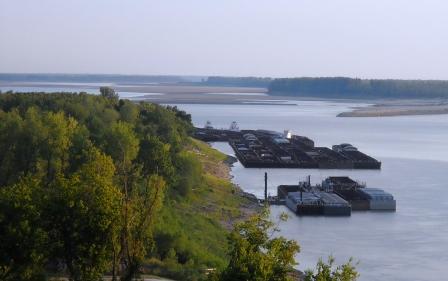 Sen. Rand Paul and state Sen. Ken Winters listen to Army Corps spokesman at Hickman meeting on Miss. River policy a year ago.
(Washington DC - Dec. 3, 2012) - For Kentuckians lately, it’s been all about water. Last year, too much water resulted in a flood. This summer, too little water hit us with a drought. And now, western Kentucky is facing another water problem – but this time, it’s man-made.
Every year around this time, the Army Corps of Engineers restricts the flow of the Missouri River into the Mississippi River. Usually, this is a routine measure of little consequence. This year, however, the impact is significant. The drought has left water levels on the Mississippi River unusually low, and the impoundment of water by the Corps is making the situation worse – so much worse that a critical stretch of the River will not be able to support barge traffic by mid-December. Without access to river transit, nearly $7 billion in crude oil, coal, and agricultural products will be held at port while the regional economy stutters to a halt, causing national consequences.
The Corps claims they don’t have the legal authority to address this situation. Whether or not they have this authority is still in dispute, but this debate makes one thing very clear: the Army Corps of Engineers is a bloated, blundering bureaucracy, causing as many problems as it claims to solve, and lacking the flexibility and common sense to respond to even the most obvious of issues. In this case, the best action is actually no action at all. The Corps could just simply do nothing, and the rivers would continue flowing from the Missouri River to the mighty Mississippi.
The Corps’ primary civil works mission areas are navigation, flood risk management, and the relatively recent addition of ecosystem restoration. However, years of Congressional earmarking have resulted in an over-extension of Corps authority into areas of hydropower generation, harbors and ports, recreation, and coastal and beach protection. This has left the Corps too large, overextended, and bureaucratically controlled to quickly respond and focus in the areas they are actually needed – and in Kentucky, that is flood control and navigation.
Instead of repairing ba dly needed dams, the Corps is building beaches. Instead of simply reversing their operating procedure to allow the Mississippi waters to rise to a navigable depth, the Army Corps’ army of lawyers is placing administrative priorities above Kentucky commerce. This is as unacceptable as it is shameful. dly needed dams, the Corps is building beaches. Instead of simply reversing their operating procedure to allow the Mississippi waters to rise to a navigable depth, the Army Corps’ army of lawyers is placing administrative priorities above Kentucky commerce. This is as unacceptable as it is shameful.
The Corps is operating under an outdated and overextended management system, one that does not reflect modern realities. Next year, I hope to have the opportunity to address these issues as Congress considers a new Water Resources Development bill, which will potentially provide some sorely needed reform opportunities for the Army Corps of Engineers.
In the meantime, I am continuing to focus on maintaining navigation to a critical section of the Mississippi River. Unless the Corps reverses itself, nearly 300 million bushels of agricultural products will be delayed in reaching the market, 3.8 million tons of coal will be shut in, 5 million barrels of domestically produced crude oil will be replaced by imported crude oil, and thousands of jobs will be put at risk. The impact of this issue is too significant to go unaddressed, which is why I am engaged with the Corps, the office of Gov. Steve Beshear, and the Kentucky Congressional delegation to ensure that the Corps is not allowed to turn its back on the needs of Western Kentucky, the Mississippi River region and entire Midwest. |








